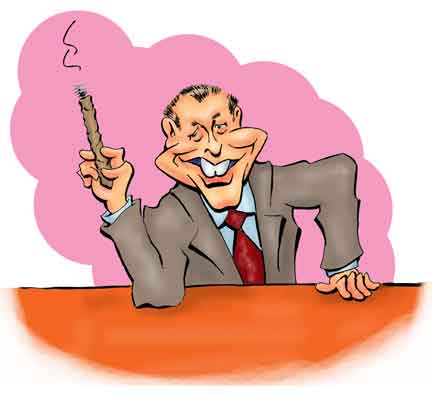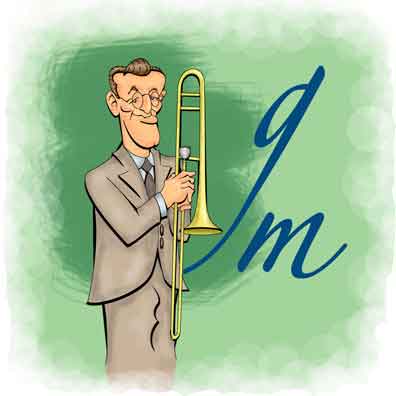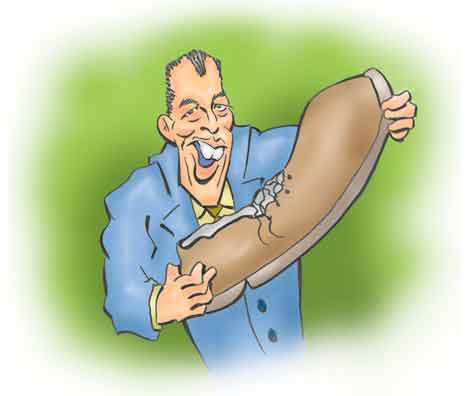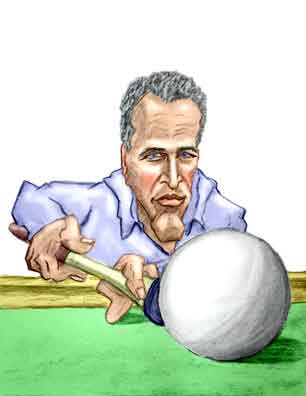Jackie Gleason
How sweet it is!
(To click on the image to
zoom in and out, that is.)
When Jackie Gleason was six years old his dad, Herb, took him to the Halsey Theater in Brooklyn. There they saw some silent movies and also a live vaudeville1 show. Young Jackie particularly loved the comedian who appeared on stage and had everyone laughing. That, he told his dad, was what he wanted to do.
Footnote
Vaudeville is the name given to stage entertainment of a variety of acts, mostly comedy, singing, and dancing. Vaudeville is usually referred to the live performance on the American stage while in England they called it music hall entertainment.
Jackie began teaching himself the craft of comedy. He found he could do impressions, put on crazy faces, and tell jokes. He would send his friends and family laughing.
Then when Jackie was nine, Herb took the family's photo albums and removed all the pictures of himself. From the insurance firm where he worked, he called his wife, Mae, to meet him in City Hall Park in Manhattan about half a mile after the cross over from Brooklyn Bridge. He never showed up and no one ever saw him again.
Jackie couldn't believe his dad would abandon them and for years convinced himself - or at least imagined - that his dad had come to an untimely end due to the nefarious albeit vague machinations of organized crime. But he didn't give up his ambition to be a performer.
Although Jackie did take part in high school plays and assemblies, his somewhat disruptive behavior and sardonic humor kept him on the wrong side of the teachers. Although he tried attending a vocational school for a year he finally dropped out and was determined to start being a professional comedian.
His first attempt at performing before a real audience was at the Halsey Theater where he had first been inspired to the stage. Jackie and a friend entered an amateur contest where they sang, danced, and told jokes. They won the competition and were perhaps helped by the fact that they had packed the theater with their friends and families (Jackie's mom was in attendance). On the other hand, the master of ceremonies, a young man named Sammy Birch, had been impressed with Jackie on his own merits. Since Sammy was soon leaving for a tour, the theater manager asked Jackie to take Sammy's place. Naturally Jackie accepted.
Jackie also began auditioning for clubs and theaters. For the next few years he landed work as what was then called a monologist, or in today's lingo a stand-up comedian. But he would also take any job that would pay as long as he was in front of an audience. That included a high diving act in Atlantic City, and he was even a professional boxer for a short time.
He continued to live with his mother and both barely made enough to get by. Naturally Jackie couldn't afford to pay writers. He had find his own material and he got it wherever he could.
In 1939 Jackie was 23 years old and playing at a small club in New Jersey. Then he got a phone call.
"I hear you're doing all my monologue jokes", said Milton Berle, perhaps the biggest comedian of the day.
"Why not take from the best?" Jackie quipped.2
Footnote
The irony is that Milton himself had a reputation for pinching other comedians bon mots. He would joke about it himself but later said it wasn't true and the brouhaha had been just a way to drum up more publicity.
A few months later Milton caught Jackie's act. Yes, the then slim young man was using Milton's jokes but in a completely different manner than the old pro. There wasn't anything to get steamed about. He went up to Jackie afterwards and wished him luck.

Milton Berle
Monologist
Some critics maintain that straight stand-up really wasn't Jackie's forte. Instead, he was best when he was improvising and interacting with the audience. That way he could take a drunken heckler and use him as a straight man. That sort of stuff got better laughs than simply standing up and telling jokes.
Milton himself had been playing at the swank Club 18 in New Jersey. He suggested to the managers that they give the young man a try. Jackie's appearance was a success and he was signed up for the Club 18 for a year.
The stint brought him an offer to appear in a Broadway show. This was Keep Off the Grass and was a series of musical acts. Also at this time Jackie met Jack Philbin who would be his manager for most of his career.
When we say the Club 18 was swank we mean swank. It was, in fact, one of the major East Coast hangouts for the biggest stars. By that time Jackie was what we'd call an insult comic and he soon was tossing barbs at any of the celebrities who came in.
It was during one of the performances at Club 18 that Jack Warner came in. Yes, THE Jack Warner of the Warner Brothers. Jack, who was quite thin on top, sat down. Jackie looked at him.
"Is that your head, sir, or are you diapering a baby?" he asked. Everyone at the table held their breath but Jack laughed. After the show he made Jackie an offer to be contract player for the studio. It would pay $250 a week. Jackie immediately hied off to Hollywood.
Unfortunately Jack Warner hadn't bothered to tell anyone he had hired Jackie. Jackie showed up but was barely able to get through the studio gates. When he did there was no one in the casting department who had any roles for him. By then Jackie was quite hefty and one director said if Jackie could shed some pounds he might be able to use him.
Jackie lopped off fifty pounds. The director then told him he was too thin and wasn't funny. Finally Jackie optimized his humorous heftiness and was cast in Navy Blues.
The role was minor but Jackie was now a bonafide Hollywood actor. For the next few years he landed small parts in other films. Then in 1942 Jack Warner loaned Jackie to Twentieth Century Fox to play the part of an upright bass player in Orchestra Wives, a film which starred Glenn Miller. Although not a star billing neither was role just a bit part. Glenn's character, by the way, was named "Glenn Morrison". That way the studio could use the same monogrammed music stands that Glenn had for his real orchestra.

Glenn Miller/Gene Morrison
Of course Jackie did not abandon his night club act. His performances were attracting notice of even iconic stars. Once Charlie Chaplin caught Jackie's show and said Jackie had made him laugh. That was a supreme compliment.
Jackie was now a well known and even respected comedian but not yet in the upper echelons of celebrity. Also his hard partying lifestyle took its toll. Although World War II was in full swing he was now so stout that he was declared unfit for military duty. He was also a heavy drinker which sometimes made working with him difficult.
His salaries were substantial but varied. He might get $350 a week in one club and then when Milton Berle fell ill and asked Jackie to stand in for him, he demanded Milton's salary - $10,000 a week. And he got the money.
Jackie was gaining more and more confidence, a confidence that was often irritating to his acquaintances particularly when that confidence was inflated with generous libation. Jackie had been a good pool player since he was a kid, and once he was sitting in Toots Shor's restaurant with some big names, Toots, Frank Sinatra, and Milton among them.
Jackie was tossing down the drinks and boasted he could beat anyone in the house at pool. Frank then introduced a small smiling man as his tailor, Guido Lombardi. Guido, said Frank, was a pretty good player, and he'd take Jackie on. Jackie said he'd play for whatever stakes they wanted, and so they hied off to McGirrs' Billiard Academy.
Jackie handily won the first few games and kept upping the bets. Finally they were playing for $7400. Sitting back confidently, Jackie was dumfounded when Guido the Tailor sank 134 consecutive balls. "Guido" it turned out was really Willie Mosconi, arguably the greatest pocket billiard player ever. It's hard to tell if Jackie was more irritated for losing the game or for falling for the oldest pool hustle in the book. Eventually he paid off the bet.
After the War it was inevitable that Jackie would move to the hottest entertainment venue in the history of the universe - television. In 1948 he appeared on Toast of the Town, a variety show hosted by a dour faced Broadway journalist. Later the show changed its name to The Ed Sullivan Show. Jackie didn't do stand up but instead performed a routine where he played a pinball player. The skit was a hit and Jackie was seen, if not by millions, then at least by hundreds of thousands.3
Footnote
There were only 1.6 million sets at the time. But they were selling at 100,000 per month.

Ed Sullivan
The Toast of the Town
Another break came when the producers of the Life of Riley wanted to adapt the popular radio show to the new medium. However, the star of the show, William Bendix, was forbidden by contract to play the role on television. So Jackie starred in 26 episodes. But soon Bill was able to get an agreement to move to television, and if you see a re-run, it will almost certainly be with Bill, not Jackie.
Jackie didn't abandon Hollywood, of course. In 1950, he was featured in The Desert Hawk, a film with a rather stereotypical plot of the Exotic Middle East of the Desert of the Low Slung Palms and Sleepy Oases. Jackie played a character named Aladdin and was included mostly for comedic relief. The director, by the way, was Fred de Cordova who later directed a picture starring Bonzo the Chimpanzee and some other guy. Jackie hated The Desert Hawk and didn't appear in another film for a decade. Fred, by the way, finished his long career as the producer of The Tonight Show Starring Johnny Carson.
But 1950 also brought Jackie the BIG break that ultimately made him a household name. He was asked to take over from Jack Carter as the host of the Cavalcade of Stars. This was a variety show played before a live audience - in effect vaudeville for television. Jackie would come on stage and deliver a monologue. There would be a dance routine by the June Taylor Dancers and then a number of other acts by guest performers. Jackie himself would appear in comedy sketches playing the different characters that later became his trademarks.
Cavalcade of Stars was produced by the DuMont Television Network, a largely forgotten but pioneering broadcast company. Then - at least according to many tellings - in 1952 William Paley, President of CBS, offered Jackie a massive salary for essentially the same show, promising him complete artistic control. Retitled as The Jackie Gleason Show, that's the name everyone remembers.
That's true enough except according to Bill's biographer, it wasn't he who offered Jackie the $5 million (or whatever it was) to come to CBS. It was Frank Sutton, who was Bill's #2 man. In fact Bill hadn't even known who Jackie was and roundly chastised Frank for signing such a little know star for such big bucks. But however it happened Jackie came to CBS.
Actually The Jackie Gleason Show was three shows (or four counting Cavalcade of Stars). Cavalcade of Stars ran to 1952 and then the first CBS production of The Jackie Gleason Show ran from 1952 to 1957.
Then in 1962, The Jackie Gleason Show was revised and also dubbed American Scene Magazine. This lasted until 1966 and the final Jackie Gleason Show was on from 1966 to 1970. Finally Jackie starred in a Jackie Gleason Show special in 1973. Originally broadcast from New York, the productions switched to Miami Beach in 1964.
In the first show on the DuMont Network, Jackie played in a sketch where he took the part of a New York bus driver living in a somewhat dilapidated Brooklyn apartment. The character was loud and blustery, and he and his wife continually argued. The sketch lasted only five minutes and Cavalcade of Stars produced over 20 more skits with the same characters.
What was unusual is that the skit was about ordinary people working at ordinary jobs. It was not about some icky sweet Pollyanna Perfect household. The couple griped at each other and every day something went wrong. But beneath all their bickering Ralph Kramden (as the character was ultimately named) and his wife, Alice, were really happily married. The segments were later expanded to a half hour series with the deliberately ironic title The Honeymooners.
After the first few skits, two new characters were introduced. Art Carney had been in the first sketch as a policeman but now he filled the role of sewer worker Ed Norton who with his wife, Trixie (played by Elaine Stritch), lived in an apartment upstairs from Ralph and Alice. Although there are claims that Jackie was increasingly miffed that Ed soon became as popular with the audience as Ralph, Art himself said he never had problems with Jackie.
The part of Alice was played by Pert Kelton. Nine years older than Jackie, she had appeared in silent movies along with Charlie Chaplin. Why she left the show varies with the telling. The most common story is her politics made replacing her inevitable during the "Red Scare" of the 1950's. The other reason is when the troupe was on tour in Chicago she had a heart attack and although she recovered the show needed to find a substitute. Another telling is that the heart attack story was devised so Pert could leave the show without adverse publicity. In any case, in later years she returned for a guest slot as Alice's mother, a role that was also filled by Templeton Fox. Templeton, by the way, was about the same age as Jackie.
Audrey Meadows took over the role of Alice. The usual story is that at first Jackie thought Audrey was too pretty to play Ralph's wife. But she had some photos taken of her wearing old clothes and with mussed hair. Then she got the part. Jackie, though, said Audrey simply came in, read for the part, and he decided she was the one. Joyce Randolph played Trixie.
One thing that Jackie hated was rehearsals. He felt that comedians who prepared extensively would expect everything to fall into place. But if the audience didn't laugh as planned the actors would be thrown off. He also believed that performances were more spontaneous if the lines and action were not explicitly memorized. On the other hand, most of the other stars wanted rehearsals, and Audrey in particular wanted the details worked out in advance. The compromise - if you want to call it that - was that Jackie just didn't show up for rehearsals and someone else would stand in and read his lines.
Of course, this was live television and without the star making the rehearsals things could go awry. So they developed signals if something unexpected came up. For instance, if Jackie forgot what he was supposed to do for a scene he'd rub his stomach and that would cue the others to give him a subtle reminder.
The Honeymooners was a hit and grew in popularity. It was revived a number of times over the years, and Sheila MacRae later took over the part of Alice and Jane Kean that of Trixie. But Art Carney was Ed Norton from the first to the last.

Paul Newman
The Hustler
We mentioned that after The Desert Hawk, Jackie didn't make any motion pictures for ten years. But that picture, The Hustler, featured his best known film role. Jackie played the pool great Minnesota Fats who accepts the challenge of the small time time pool hustler "Fast" Eddie Felson played by Paul Newman. The Hustler is probably Jackie's most distinguished role and the film is considered a classic.4
Footnote
You will read that there really was a "Minnesota Fats" whose real name was Rudolf Wanderone. However, Rudy only began calling himself Minnesota Fats after the motion picture was released. Rudy maintained that he had been the model of the character although the author of the book, Walter Tevis, said this wasn't so.
Rudy was definitely a champion player but consensus seems to be that Willie Mosconi was better. The two met for a televised challenge in 1978 that was moderated by Howard Cosell. Actually for a while the match was amusing enough with Rudy's typical haranguing of Willie. But eventually Rudy's banter got to be a bit much even for Howard. At one point he patted Rudy's considerable paunch and asked him to be a good boy. Willie, by the way, bested Rudy easily, winning the triple gamed match with Nine Ball (5-3), Eight Ball (5-2) and Rotation (5-2).
And yes. Throughout all this time Jackie had a family. He had married Genevieve Halford in 1936 when he was 20 but truth to tell Genevieve and their kids seldom saw him. Naturally his long and indefinite absences - not to mention Jackie's partying and playboy lifestyle - put a strain on the marriage. Nevertheless they remained married until 1970, the year The Jackie Gleason Show closed. Jackie married twice more.
Naturally Jackie didn't retire. He continued to play in nightclubs, in Las Vegas, and he also kept making movies most notably the Smokey and the Bandit series, I, II, and III. He also starred in The Sting II, the follow-up of the movie with Paul Newman and Robert Redford. It was not, to put it politely, a great success.
Another well-known part of Jackie's career was his music, and he's credited with over 40 long playing albums of full orchestral romantic mood music.5 As he had no formal musical training and was not able to read music, it's been debated how much Jackie actually composed and conducted. But there are those who worked with him - including his band leader Sammy Spear6 - who said Jackie had an incredible ear and did indeed compose and even conduct music himself. He would pick out the basic tunes on the piano and turn the final fashioning to the professionals. And we should remember that Mathew Brady, the famous Civil War photographer, never took any of his photographs himself.
Footnote
One of Jackie's tunes was his iconic television theme song, "Melancholy Serenade". Also once Jackie and Sammy played a trumpet duet. He asked Sammy just to add the backing and moderatos, but of course Sammy showed Jackie up.
Footnote
Sammy was known for his flamboyant costume and during the monologue Jackie would make pointed comments about whatever suit Sammy was wearing. If this sounds familiar it was similar to how in later years another television celebrity dealt with his bandleader.
Jackie lived until 1987, age 71. Given his lifestyle - he was a massive eater of red meat and few vegetables, took no exercise, and drank more than any fish could imagine - it's a surprise that he made it that long.
References
Jackie Gleason - An Intimate Portrait of the Great One, William Weatherby, Pharos Books, 1992.
"Jackie Gleason", Encyclopedia Britannica.
"Miss Your Favorite Entertainers? Reminisce With Their Las Vegas Recordings", Alex Haase, Las Vegas Magazine, June 21, 2020.
"CBS' 'Gleason': How Sweet It Isn't", David Zurawik, The Baltimore Sun, October 12, 2002.
"Here’s What Happened to Art Carney Before, During and After Playing Ed Norton on 'The Honeymooners'", Ed Gross, Closer, April 15, 2020.
"Jackie Gleason", Internet Movie Data Base.
"The Honeymooners", Internet Movie Data Base.
"Minnesota Fats", NNDB.